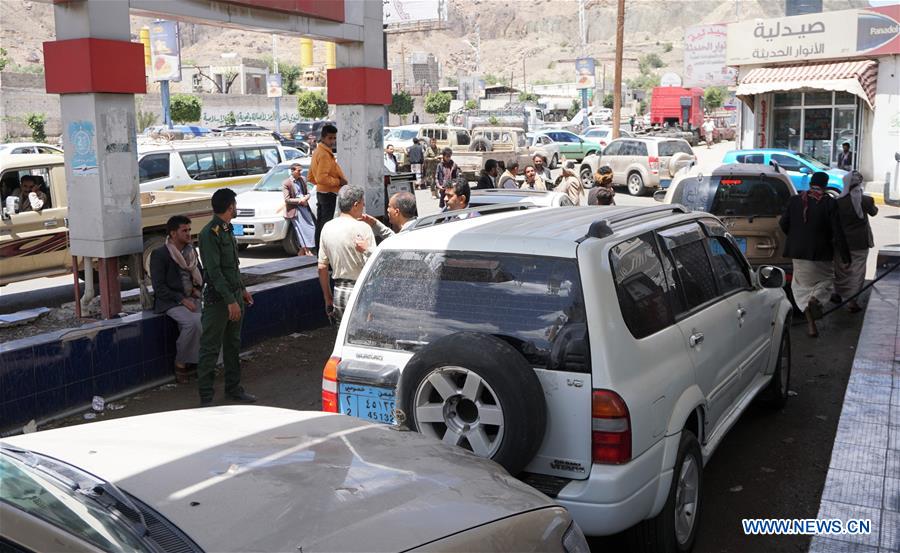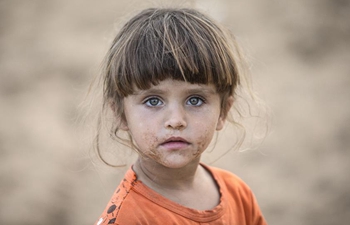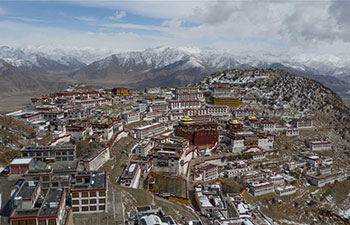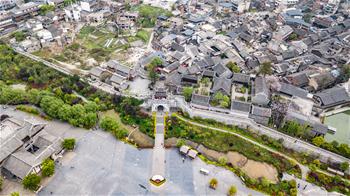
Cars line up in queues to reach the gasoline pump in Sanaa, Yemen, on April 13, 2019. Yemen is facing severe fuel shortage and food prices rising, and the crisis is crushing the starving population. (Xinhua/Mohamed al-Azaki)
by Mohamed al-Azaki
SANAA, April 13 (Xinhua) -- Yemen is facing severe fuel shortage and rising food prices, and the crisis is crushing the starving population.
The United Nations is struggling to save a peace deal, seen as a hope to end the country's four-year civil war, which is grinding into its fifth year and has pushed more than 20 million to the brink of famine.
Frustration is growing in the rebel-held capital Sanaa as the crisis is deepening pains of the residents.
Moftah Mohammed, a taxi driver, said he had been queuing for four hours to reach the gasoline pump to fill his car.
"I'm working with a school and I need to fill my car's tank in order to transport the students ... Yesterday I was waiting in the line for more than five hours and when I approached the fuel pumps, they said the gas ran out," he complained.
Abu Qaid Hatim, also a taxi driver, said he has to wait in the long queue to fill his car so he can work and earn cash for his children.
"We want to live a normal life ... I hope the fuel crisis and war end very soon," he added.
Thousands of state employees have turned to work as taxi drivers to make a living and feed their families after being unpaid for nearly three years.
The fuel crisis in Sanaa was not the first of its kind. The crisis has hit the country repeatedly.
According to local authorities, only two petrol stations were open in Sanaa this week while nearly 200 others ran out of fuel. Queues of waiting cars extend to more than three miles in front of fuel stations.
Many drivers return home with empty tanks. Thousands of vehicles died off the road. They have either to wait two to three days in front of petrol stations or buy the fuel from black market for double price.
Ibrahim al-Khayat, an official at the Houthi-controlled oil ministry, said the reason behind the fuel crisis is that "nine oil tankers were denied clearance to enter Hodeidah port."
However, the Yemeni internationally-recognized government said in a statement this week that it had permitted some oil tankers which submitted "required documents on their shipments," while some other oil shipments did not provide the "necessary documents" to get clearance to enter the port.
The ongoing fuel crisis also disrupts functioning of hospitals in the rebel-held cities, which depend on generators, normal transportation, humanitarian aid and food relief.
Fears soar that the fuel crisis could trigger another wave of cholera epidemic, which threatens the lives of millions of severely malnourished children.
Yemen has registered the world's highest number of cholera cases since 2017, with the infection of 1 million and over 2,000 confirmed dead, according to the World Health Organization.
A peace deal reached between Yemeni warring parties in December last year has hit a deadlock. The deal, with the first step toward finding a comprehensive political solution, focuses on the port city of Hodeidah, the lifeline for Yemen's most commercial imports and humanitarian aid.
Though both warring parties have largely obeyed the cease-fire deal, they have failed to withdraw forces from the city.
UN envoy Martin Griffiths has been shuttling between the Iranian-allied Houthi rebels in Sanaa and the Yemeni government in exile in a bid to end the civil war, which erupted after the rebels seized much of the country's north in late 2014.















